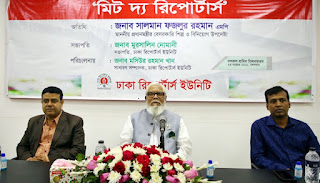Salman Fazlur Rahman, private industry and investment adviser to the prime minister, on Tuesday said that defaulted loans existed in almost all countries in the world. He while replying to a question on how the local banking sector could be freed from the bad loan culture also said that provisioning of loans and expanding banks’ capital base were necessary to check defaulted loans.
Salman who was speaking at the ‘Meet the Press’ programme of the Dhaka Reporters’ Unity in the city said that state-owned banks were mainly facing problems of bad loans. Defaulted loans in private banks have not increased, he said.
Salman also gave answers to questions on the country’s share market, foreign direct investment, tax, falling price of fuel oils in the international market, foreign workers, digital security act and Covid vaccine during an hour-long parley at the DRU auditorium. He identified a lack of institutional investors and the absence of secondary bond market as major ‘defects’ in the stock market and its inconsistency. The government is working to remove the defects, he said. He said that the county’s tax-GDP ratio had not increased despite a many-fold economic growth over the years. The National Board of Revenue has not been able to expand the tax net, he said.
Salman, also the vice-chairman of the BEXIMCO Group, said that 35 out of 65 services had already been facilitated to local and foreign investors under the Bangladesh Investment Development Authority’s one-stop service. He also said that the rest of other services mainly link to the NBR were yet to be bright under the BIDA’s one-stop service. In the absence of the services, local and foreign investors are raising allegations, he said. He, however, said that the BIDA’s one-stop service had already become popular.
Salman disagreed with data of outbound remittance at the tune of $3 billion annually by foreigners working mainly in the local textile sector. Referring to a Bangladesh Bank assessment, he said that the amount would be $200 million to $300 million. He also disagreed that the prices of medicines were high in the country compared with that of others countries. He hoped that the country would be able to produce Covid vaccine next year as both the private and public sectors were actively trying to obtain the manufacturing facility from abroad.
He also hoped that the import of Covid vaccine from the Serum Institute of India would resume in the next month. He noted that the suspension on export of vaccine from Serum had happened because of the ‘unfortunate’ situation of the Covid case spike in India. He said that he was against the misuse of the Digital Security Act 2018 to harass journalists. He, however, said that a Digital Security Act was imperative for stopping abuse of social media since a false post on social media could run havoc in society.


